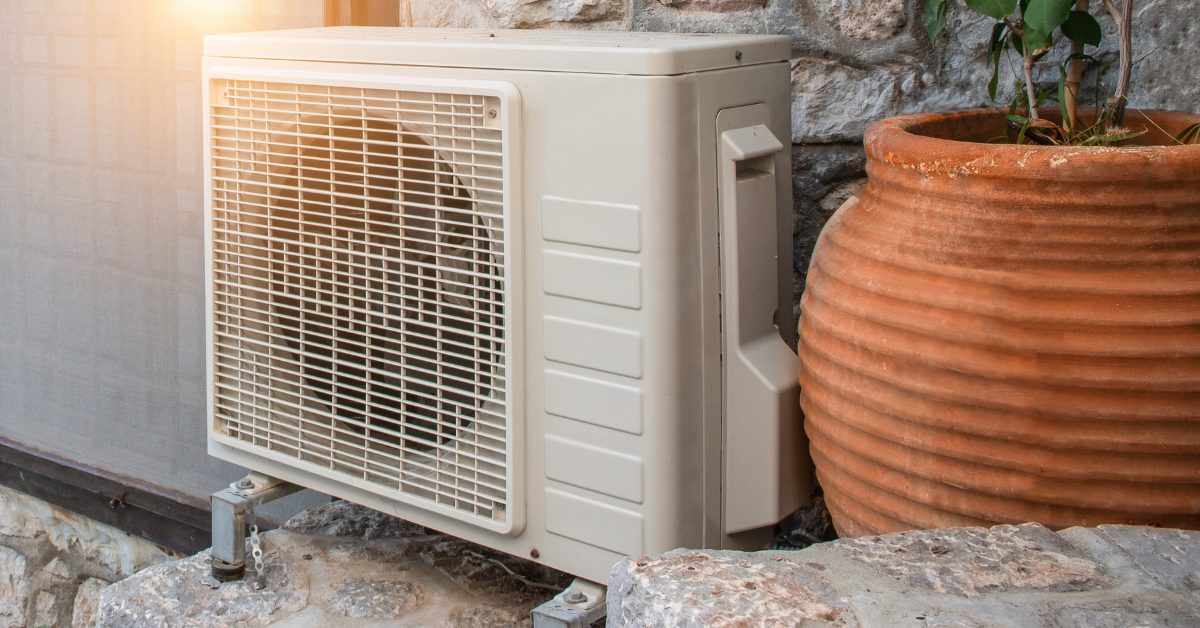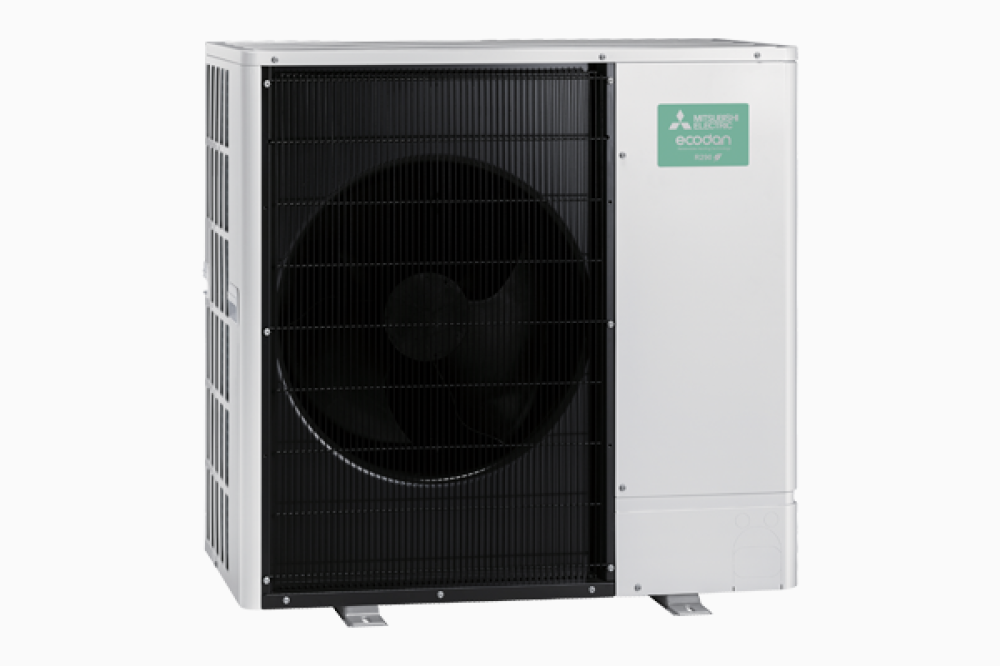Do Heat Pumps Dehumidify?

Heat pumps are transforming how people heat and cool their homes. These innovative systems use renewable energy and can preserve fossil fuels, making them excellent alternatives to traditional gas boilers.
Most people know that heat pumps are a year-round solution for temperature regulation, heating homes in the winter and cooling them in the summer – but they also make great dehumidifiers.
Find out how heat pumps dehumidify and why it benefits your property in this guide.
How do heat pumps work?
Heat pumps are innovative systems that heat and cool a home by collecting energy from a natural source and transferring heat indoors and outdoors.
They’re more sustainable than traditional heating systems, as the pumps don’t need to generate heat; they utilise refrigerant cycles to move it. There are two main heat pump modes:
- Heating Mode: When in heating mode, your pump will collect heat from the outdoors and transfer it to your property. Air-source heat pumps collect heat from the air, while ground-source pumps use the earth’s natural temperatures.
- Cooling Mode: Cooling mode essentially works in reverse to heating mode, with the heat pump extracting indoor heat and moving it outdoors to cool a home.
The dehumidification process usually occurs during cooling mode, as it conditions the air.
How do heat pumps dehumidify?
As all-in-one heating and cooling systems, heat pumps offer multiple functions, including a dry mode setting. When this mode is activated, it continues to remove moisture from the air and maintain optimal temperatures.
Even heat pumps without a dry mode setting can remove excess moisture, which is a byproduct of the cooling process.
When warm air passes over the heat pump’s evaporator coil, the cold surface means the moisture will turn into water droplets. These droplets are collected in a drain pan and removed from the property.
In turn, this reduces humidity and improves indoor air quality, creating a better environment during the warmer months.
Can heat pumps dehumidify in winter?
While heat pumps remove humidity during the warmer months, they don’t have the same effect in winter. However, this is usually a good thing, as humidity levels drop in winter and using the heat pump’s cooling mode could aggravate preexisting conditions or cause new ones, including:
- Asthma flare-ups
- Eczema
- Respiratory symptoms
- Nosebleeds
- Sore throat
Are ducted heat pumps or ductless heat pumps best for dehumidification?
Aside from choosing whether you want a ground, water or air-source heat pump, you’ll also need to choose between ducted and ductless systems. While both have their benefits, they handle indoor humidity differently.
Home installation experts can identify the right type for your needs when choosing heat pumps, ensuring you benefit from a year-round heating system.
Ducted heat pumps
These heat pump systems circulate hot or cold air throughout a property using a ductwork system. They’re ideal for larger homes with extensive needs, but the building should already have ductwork installed. If it doesn’t, you’ll need to pay for a professional service before you can use these pumps.
Ducted heat pumps dehumidify an entire house easily and are an efficient option for large homes. However, smaller properties might find them too expensive and ducted pumps aren’t the best option if you want to focus on specific rooms.
Ductless heat pumps
Most ductless heat pumps are air-source, which means they collect heat from the air and circulate it throughout your home. Also known as mini-splits, these systems give you more control over which rooms to cool, making them ideal for smaller properties.
While ductless heat pumps effectively dehumidify a house, they can cost more to run. Ultimately, it depends on the type of pump you want and your property’s size.
Which factors impact a heat pump’s dehumidification process?
So, we’ve established that heat pumps can dehumidify your home when used as cooling systems, but certain factors might impact their performance. Luckily, most are avoidable when you know what to look for:
- Size and Efficiency: It’s vital to find the right size heat pump for your home. Bigger isn’t always better, and oversized systems can cool the property too quickly, leading to short cycling. Opting for a suitable heat pump also avoids excess energy consumption.
- Fan Speed: Lower fan speeds allow more time for the air to pass over your heat pump’s evaporator coil, enhancing the dehumidification process.
- Humidity Levels: Some areas have higher humidity levels than others, so a heat pump might have to work harder.
How to enhance your heat pump’s ability to dehumidify the property
Many heat pump systems have modern features that ensure they can operate in a variety of conditions and provide reliable temperature regulation. However, their dehumidification properties can sometimes fall short. The following tips will enhance dehumidification and keep your home comfortable.
Use variable-speed technology
Opting for a newer heat pump means you can take advantage of the latest features, including fans and variable-speed compressors. These features mean the heat pump can dynamically adjust its operation to maintain consistent indoor temperatures and reduce humidity levels.
Thermostats
Installing advanced thermostats can be beneficial, as many come with integrated humidity sensors that monitor indoor levels and make adjustments to remove excess moisture from the environment. Smart thermostats pair perfectly with heat pumps, as they can optimise operation.
Never forget maintenance
Heat pumps are relatively easy to maintain compared to gas boilers and older fossil fuel systems – but they do need ongoing care.
Minor component issues can impact your pump’s ability to dehumidify, so be sure to regularly check the heat pump filters on indoor units for any signs of blockages or damage. If the blockages are severe, you might need to replace them, as they can limit airflow.
Removing any obstructions from or near the coils can also ensure effective heat exchange, and the drain system should be swept regularly.
The bottom line
Heat pumps aren’t one-trick ponies by any means; they’re a long-term solution for heating, cooling, and dehumidifying your home. They’re also energy efficient and can save money on your energy bills.
If you’d like to find a heat pump that will last for years, Hometree can help. We support our customers from the initial consultation to installation and aftercare. Please contact us today to discuss your needs.
Get a free heat pump installation quote
We Beat or Match Any Quote
Call 0330 912 4843 and we’ll beat or match any quote.
Serious About Service
24/7 claims support & rated Excellent on Trustpilot
Cover Match Guarantee
Get a £50 gift card if you find something we don’t cover
All Gas Boilers Covered
All makes and models, regardless of age


